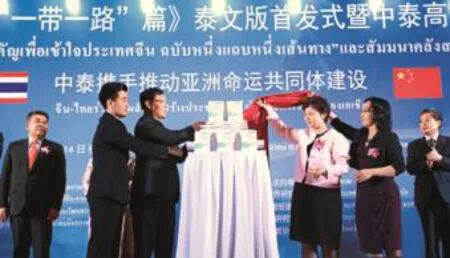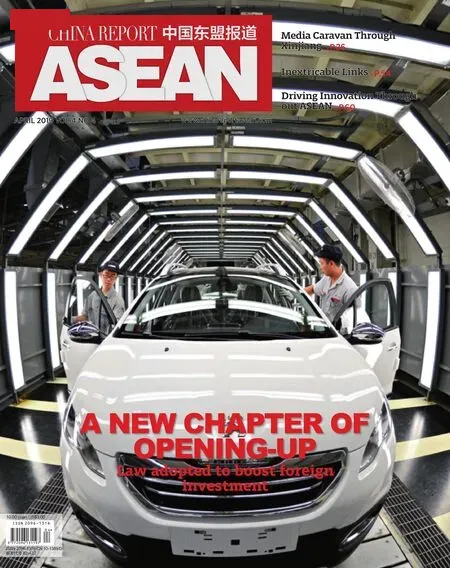BRIDGES OF UNDERSTANDING
By Dong Yan
New book poised to bring Chinese and Thais closer together
On March 14, the launch ceremony of Keywords to Understand China: The Belt and Road Initiative (Thai Edition) & China-Thailand High-end Think Tank Dialogue took place in Bangkok, capital of Thailand. Guided by China International Publishing Group(CIPG) and the Chinese Embassy in Thailand, and co-organized by the Academy of Contemporary China and World Studies, China Report Press, the National Research Council of Thailand and the Thai-Chinese Journalists Association, the event marked “a major innovation in integrated communication involving think tanks, media and publications”as described by Chinese Ambassador to Thailand Lyu Jian.
Authoritative Translation
Geopolitically at the core of the ASEAN region, Thailand is not just a regional hub for logistics,trade and finance, but a natural bridge linking Chinese and ASEAN markets. Alongside more than 10 million Chinese tourists visiting Thailand each year,Chinese students studying in Thailand have exceeded 40,000 and some 1 million Thai people are learning Chinese in Thailand,as China continues gaining a high degree of recognition among Thai citizens. As connotations of some specialized words and phrases have morphed along with constant updating of the Thai language over the years,accurate translation could play a vital role in better disseminating the concepts of the Belt and Road Initiative (BRI) in Thailand. In this sense, Keywords to Understand China: The Belt and Road Initiative(Thai Edition) has set a good example. Through precise translation and authoritative explanation of keywords related to BRI, the book is poised to greatly facilitate communication between China and Thailand,especially in terms of BRI.
Chaweerat Kasetsunthorn,assistant to the Minister of Culture of Thailand, opined to China Report ASEAN that using contemporary language, the book Keywords to Understand China illustrates the past, present and future of the Belt and Road to Thai readers, which will facilitate a better understanding of China and promote relations and cooperation between Thai and Chinese people.
According to Ambassador Lyu Jian, the timing of the book's publication is opportune considering the pressing demand of Thai people for deepened understanding of China and increased exchanges with their neighbor. “It is a significant and positive step to showcase a genuine, colorful and threedimensional China to people from all walks of life in Thailand,”he remarked.

Chaweerat Kasetsunthorn,assistant to the Minister of Culture of Thailand.

Chen Dehai,secretary-general of the ASEAN-China Center.

Charoon Chaisorn,deputy directorgeneral of Thailand's Government Public Relations Department.

The launch ceremony of Keywords to Understand China:The Belt and Road Initiative (Thai Edition)& China-Thailand High-end Think Tank Dialogue in Bangkok on March 14.
The Thai edition of Keywords to Understand China not only opens a window to China's philosophies of State governance, but it also mirrors China-ASEAN relations that have seen continuous growth and improvement, noted Chen Dehai, secretary-general of the ASEAN-China Center.
“An attempt to sketch the roadmap of the BRI, this book provides an authoritative guide for the Thai public to understand the guiding principles of extensive consultation, joint contribution and shared benefits of the BRI,” asserted Chen Shi,deputy editor-in-chief of CIPG and president of China Report Press.
The multi-lingual book project“Keywords to Understand China,”implemented by the Academy of Contemporary China and World Studies and the China Academy of Translation under CIPG,aims to interpret contemporary China's development philosophies, development path, domestic and foreign policies and cultural discourse for the international community through multi-media platforms in multiple languages. So far,a series of books under the project—Keywords to Understand China (Volume 1), Keywords to Understand China: The Belt and Road Initiative and Keywords to Understand China: 19th National Congress of the Communist Party of China—have been published in 15 languages.
Brainstorming Together
Throughout the lengthy history of friendly China-Thailand ties, media has been working to boost people-topeople bonds. In the meantime,think tanks, often referred to as“brain boxes,” provide important platforms for mutual learning and exchanges between elites in different fields of both countries,propelling China-Thailand relations forward in a steady and sustainable manner.

Alongside more than 10 million Chinese tourists visiting Thailand each year, Chinese students studying in Thailand have exceeded 40,000 and some 1 million Thai people are learning Chinese in Thailand, as China continues gaining a high degree of recognition among Thai citizens.

Chen Shi, deputy editor-in-chief of CIPG and president of China Report Press.

Yang Xin, minister counselor of the Chinese Embassy in Thailand.
Following the book launch,China-Thailand High-end Think Tank Dialogue themed“China and Thailand: Towards a Community with a Shared Future for Asia” was held. A total of 11 prestigious scholars from both sides, including General Surasit Thanadtang, director of Thai-Chinese Strategic Research Center, Dr. Achakon Wongpreedee, deputy dean of the Graduate School of Public Administration of the National Institute of Development Administration of Thailand,Kobkij Praditpolpanich, dean of the Faculty of Communication Arts at Dhurakij Pundit University, Wang Linggui,executive vice chairman and secretary-general of the Institute for Global Strategy under the Chinese Academy of Social Sciences, and Shi Anbin, associate dean of the School of Journalism and Communication at Tsinghua University, conducted in-depth,heated discussions on topics such as “Cooperation for Mutual Bene fit—China and Thailand Join Hands to Push Forward the Belt and Road Initiative” and“Mutual Learning—The Role of Think Tanks in Promoting Exchanges Between China and ASEAN,” sparking insightful conversations and effective brainstorming.
General Surasit Thanadtang revealed that over the past decade, Thai think tanks have continuously improved their capabilities and endeavored to learn from their Chinese counterparts. Stressing that huge potential exists for cooperation in areas of information exchanges, decision-making consultation and talent training between think tanks on both sides, he expects bilateral think tank cooperation to advance to a higher level.
Rather than a program exclusively involving China, BRI is a new form of globalization that pools the wisdom of all countries involved, opined Professor Shi Anbin. Media innovation, co-governance of the internet and building a “digital Silk Road” will be keywords that highlight the future of China-Thailand cooperation,in which think tanks on both sides will play an important role as information providers, idea developers and talent banks, he added.
“China and Thailand face similar opportunities and challenges in the new era,” noted Dr. Tharakorn Wusatirakul,deputy director of the Thailand-China Belt and Road Research Center (TCBRRC). “Therefore,think tanks of both countries should accelerate research of each other country's development concepts, plans and development experience,promote alignment of development strategies of the two countries under the framework of the BRI, propel implementation of regional cooperation and specific projects and pave a road to winwin cooperation.” According to him, the establishment of the TCBRRC is the fruit of friendly ties between the two countries that will help enhance bilateral cooperation and friendship.He also expressed the center's commitment to providing intelligence support for bilateral exchanges and cooperation in various fields and making positive contributions to the development of a comprehensive strategic partnership between China and Thailand.
The China-Thailand High-end Think Tank Dialogue is a major international cooperation project of CIPG. Seizing opportunities brought by the China-ASEAN Year of Media Exchanges,CIPG plans to bolster highend think tank exchanges and cooperation between China and ASEAN countries, promote innovation in international think tank cooperation and aid the construction of the global governance system, so as to tangibly consolidate peopleto-people bonds among the population of nearly 2 billion people in the region.

